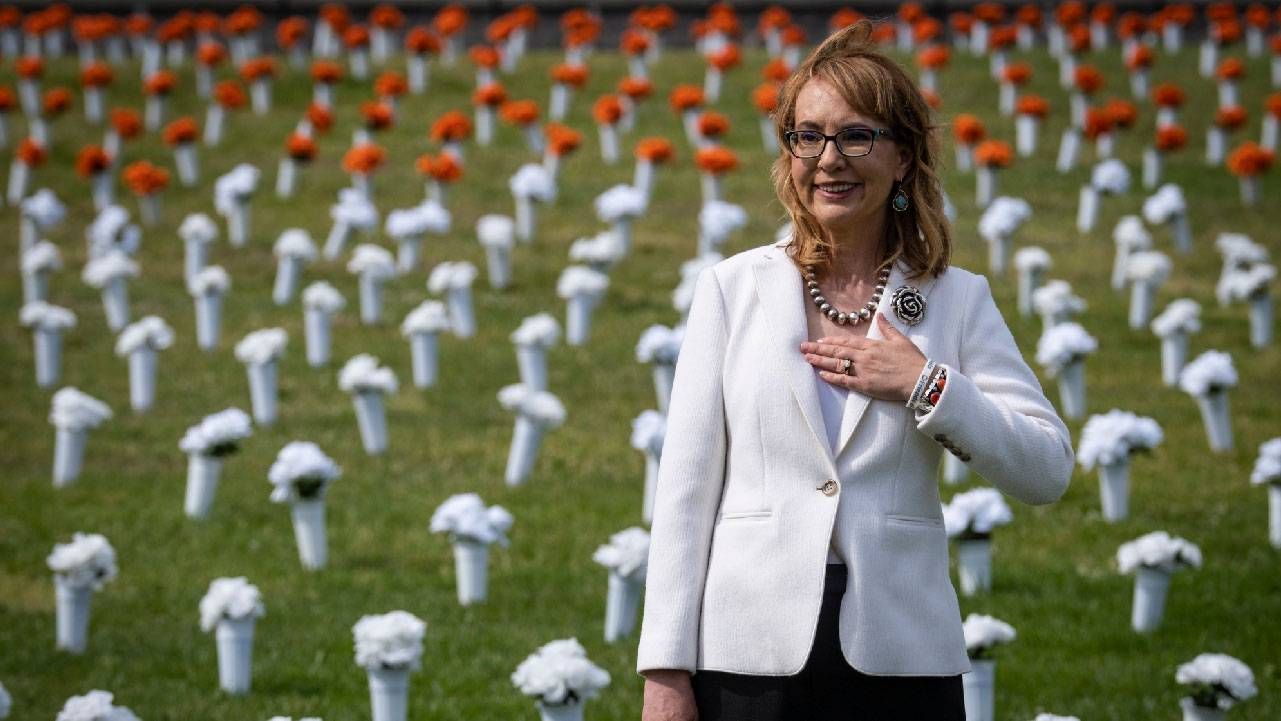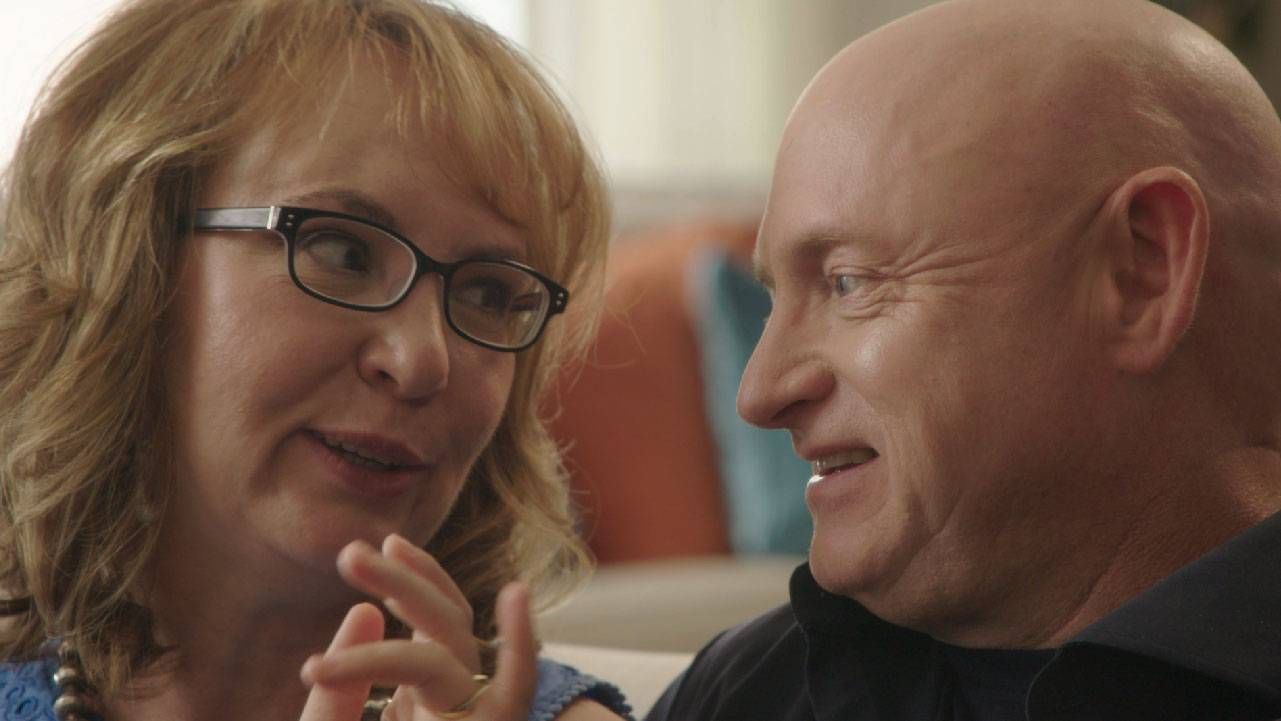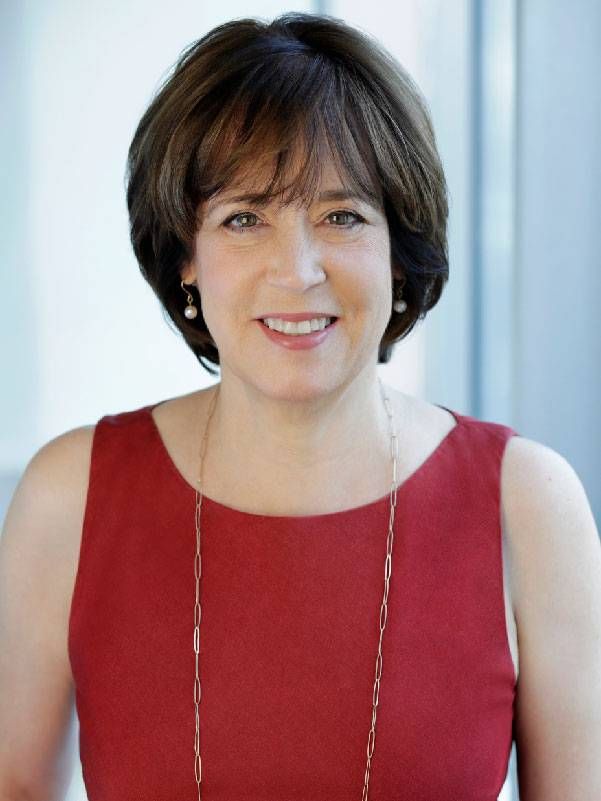The Tenacity of Gabby Giffords
In 'Gabby Giffords Won't Back Down,' filmmakers Betsy West and Julie Cohen reveal the grit and commitment of the former U. S. Representative
It was April 2020, shortly after the start of the COVID lockdown. And like many of us, filmmakers Betsy West and Julie Cohen were getting familiar with Zoom. Their first meeting with the woman who would be the subject of their next documentary, former Arizona Congresswoman Gabby Giffords, took place on a computer screen.

West and Cohen knew that Giffords, grievously wounded in a mass shooting at a meet and greet with constituents near Tucson in 2011, suffered from aphasia, the disorder that still forces Giffords to speak haltingly and with great difficulty. Sure, there were concerns about mounting a film project centered around a woman who struggled to speak. But those worries quickly evaporated.
"Gabby immediately put us at ease, lifted her foot to show us she was wearing RBG socks and this enormous grin came over her face. It was so cute," says West.
Giffords may not have worn those socks by accident. West and Cohen were also the directing duo responsible for the documentary "RBG" on Supreme Court Justice Ruth Bader Ginsburg along with other films profiling trailblazing women — Julia Child ("Julia") and civil rights activist Pauli Murray ("Who is Pauli Murray?").
"Gabby immediately put us at ease, lifted her foot to show us she was wearing RBG socks and this enormous grin came over her face."
As frequently happens to people who meet Giffords for the first time, West and Cohen may have been "Gabbified," the term Giffords' aides use to explain how Giffords instantly connects with those she meets.
"Gabby's sister told me she and her parents are much more introverted," says West. "But Gabby came out an extrovert, always a performer, in high school plays, not afraid to give speeches, even did TV commercials when she took over her father's tire business (at 26)." ("Hi, I'm Gabrielle Giffords. For 50 years. El Campo Tires has had reliable service and great value.")
By 30, the once registered Republican who became a moderate Democrat, was elected to the Arizona House. At 32, she was in the state Senate. And by 36, Giffords was headed to Washington, having flipped a Congressional seat in an Arizona district that had been solidly Republican for 20 years. Later that year, she married Navy Capt. and NASA astronaut Mark Kelly, now a U.S. Senator running for re-election.
Just a few days into her third term as a U.S. Representative and minutes into a "Congress on the Corner" event at a suburban Tucson Safeway grocery store, this rising political star was shot at point blank range. The bullet traveled through the frontal lobe of her brain where expressive language emanates. Her injuries were so severe that news organizations erroneously reported that she had died. Eighteen others were also hit in the mass shooting. Six of them, including a third-grader who was brought to the event by a neighbor, were killed.
Though Giffords was severely wounded on that awful January day in 2011, hers has been a remarkable comeback, but not an easy one. Now 52 and still partially paralyzed, Giffords has had to endure a grueling rehabilitation to regain her ability to walk, talk and write. It's all captured in a new documentary, directed by Betsy West and Julie Cohen, "Gabby Giffords Won't Back Down," now in theaters and streaming August 5. (The title inspired by the Tom Petty song).
Next Avenue reached Betsy West at her home in New York.

Next Avenue: This documentary is a rare window into the rehabilitation process over time, thanks to Mark Kelly's decision to begin filming his wife's recovery almost from the beginning. The film is built on the narrative arc of Gifford's grit in undergoing speech and physical therapy. Is it fair to ask if these recordings had not been made, would you have made this film?
Betsy West: I don't know. Certainly the access to that footage was so important to be able to show people how someone comes back from such a devastating injury. For Mark, he so believed that his wife was going to get better, really a testament to his faith, and eventually, she was going to want to see that recovery. And sure enough, he was right. I think it gives hope to people who are suffering from or have family members suffering from aphasia, caused not just by a gunshot wound but stroke or some other brain injury, who want to see the incredible advances you can make over time.
When you and Julie decide to do a documentary, you must hope to discover surprises about your subjects. What surprised you about Gabby Giffords?
I think I was surprised that Gabby seems to have no bitterness. She doesn't look backward, when you see what a promising politician she was and how all that was cut short one morning eleven years ago. It was not just her hope as a politician but hope to become a mother. She was getting ready to do IVF (in vitro fertilization) that had been scheduled at Bethesda Naval Medical Center for two days after the shooting. All of that gone, yet while I saw her frustrated at times when she couldn't find words, I never saw bitterness or looking backward at the life that might have been.
Spending time with Gabby, was there one scene or moment where you discovered her true essence?
I do think the scene of her and Mark gleefully showing us the content of their freezer, where they keep the plastic box labeled "DO NOT DISCARD. NOT TRASH." It contains a portion of Gabby's skull that was removed in the wake of the shooting to relieve pressure on her brain. The box was next to the empanadas and frozen mangoes. At first, it was kind of shocking and then it was funny. It was also emblematic of how they approached what happened to Gabby and how Gabby approaches it. It happened. She was shot, a horrible injury. She lost a huge part of her skull. She has aphasia as a result, lingering paralysis. And yet, they accept it. To me, it shows her incredible strength of character and her sense of humor.
Another memorable scene in your film was a split screen that showed the uncanny timing of Mark Kelly commanding the Endeavor to dock with the International Space Station at precisely the same moment when his wife Gabby, back on Earth, is undergoing serious brain surgery. How much of a superhuman must Mark Kelly be to have been able to compartmentalize guiding the Endeavor to dock with the Space Station without being distracted by his wife's delicate surgery, no matter how far away?
"As Mark says in the film, 'Gabby knew the risk involved in my being an astronaut. Turns out she had the risky job.'"
He's a pretty extraordinary guy and a buttoned-up guy and you can see this in his initial response to Gabby's shooting. He took charge. He was organizing the people who were coming to see Gabby and making it clear to them he didn't want any negativity around her. There would be no crying in Gabby's hospital room, please. Positive thoughts only because he had faith she would improve, and he wanted to do everything he could to help her do that. Mark's shuttle flight was delayed and neither of them expected her brain surgery while he was in space. But her situation required the operation at that time. While it does seem superhuman and when you see the two events juxtaposed, it's extraordinary. When they say, 'it's not brain surgery' or they say 'it's not like docking with the space shuttle,' it was both at the same time.
As Mark says in the film, 'Gabby knew the risk involved in my being an astronaut. Turns out she had the risky job.'
Before she was shot, Gabby had opposed the District of Columbia's ban on handguns, and gun safety legislation was not a high priority. The mass shooting that changed the trajectory of her life was followed nearly two years later by the shooting at Sandy Hook Elementary School in Newtown, Connecticut that claimed the lives of 20 six and seven-year-old children and six adults. Those events prompted Gabby to advocate against gun violence and form an organization eventually called Giffords that "supports efforts at the federal and state level to regulate assault weapons and other particularly dangerous weapons." Does her background make hers a more credible voice in the gun debate?
She's proud of being from Arizona, a state with a large gun-owning population. Gabby herself owns a gun. She has learned how to shoot with her left arm because she can no longer use her right. The shooting of the kids at Sandy Hook was the turning point for her. She was well enough at that point in her recovery to think 'Wait a minute, I have a unique position here. I know how hard politics is. I myself am a victim of gun violence.' That gives her incredible credibility. Her whole approach is to work across the aisle, and as a gun owner — not against guns, but against gun violence.
There have been thousands of mass shootings since the one in 2011 that nearly killed Gabby. How does she see the recent bipartisan gun safety legislation?

Gabby sees that as a first step. A lot of people say it's modest, that it didn't go far enough. But it's the first gun legislation we've had in nearly three decades. Gabby is someone who looks for successes where she can find them. Her organization has had success with state legislatures around the country, with red flag laws and other legislation. Gabby's shooting was, in some ways, the beginning of the spate of mass shootings
Your film starts with row upon row of white flowers in white cups on the green grass of the National Mall, an installation Gabby's organization designed to represent everyone killed in this country by guns in a particular year. As one woman bends down to place flowers in a cup, a sign in front of her reads 1,138 LIVES LOST TO GUN VIOLENCE IN ARIZONA. Her face obscured by wind-blown hair, a voice says, "So many people hurt, a lot of people died, always connected to them, grateful to survive. I'm alive." It's Gabby Giffords, masked, walking with a cane among the flowers, then the camera pulls back to reveal a wide shot of the Mall, rows of flowers in cups as far as the eye can see, a lone woman standing among them. It's very powerful.
That was 2021. I filmed there with Gabby. Forty thousand people killed in this country in 2019 by guns. That includes mass shootings, one-on-one shootings, drive by shootings and suicides. Suicides is a huge number. [The Department of Justice reports that sixty percent of all firearm deaths are by suicide and more than twice as many gun-related suicides as gun-related homicides in the U.S.]
This year, they erected the Gun Violence Memorial, but added an additional 5,000 orange flowers. The number of people killed by guns in the U.S. went up 5,000 in one year to 45,000 in 2020.
"We must never stop fighting," Gabby said. "Fight, fight, fight."
Postscript
At a White House ceremony in early July, 2022 — too late to be included in the film — President Biden fastened the Medal of Honor, the national's highest civilian honor, around Gabby Giffords' neck.
The Presidential award recognized Giffords' work to end gun violence. "Because of her,' the citation said, "lives will be saved and America will be safer." Gabby Giffords, it noted, had turned "pain into purpose."

